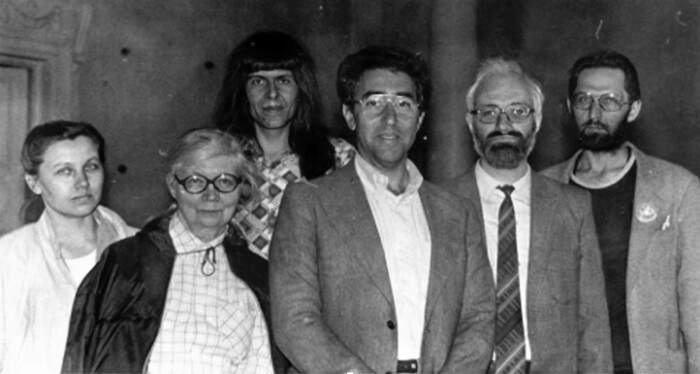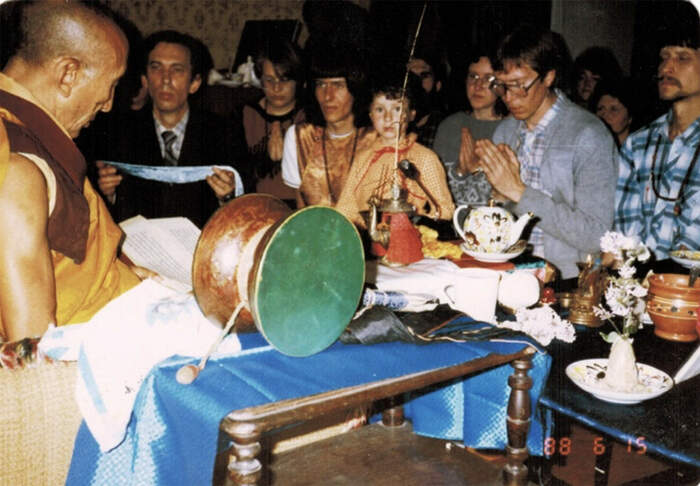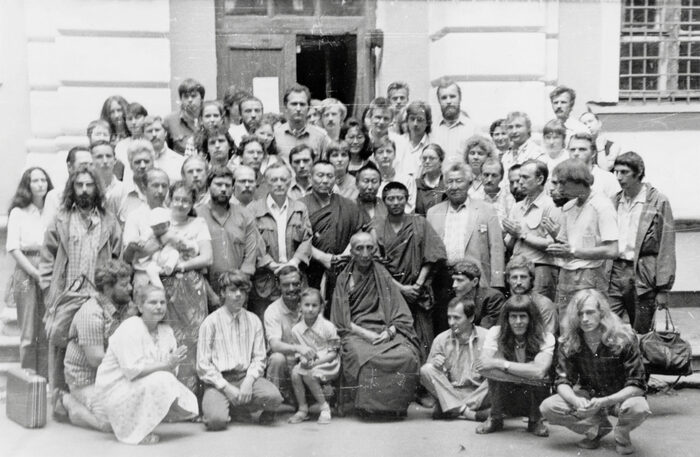Dr. Alexander Berzin
Buddhist groups began to officially register throughout the USSR only in 1988–1990. An important role in this was played by the visits and talks in 1987–90 by Dr. Alexander Berzin (1944– ), a Harvard PhD who had lived in Dharamsala, India for many years and who was one of the early occasional interpreters of His Holiness the Fourteenth Dalai Lama. Dr. Berzin’s first visit to the USSR was in 1987, during which he taught in private apartments to small groups of people in Moscow and Leningrad. But in 1988, when the spirit of more spiritual freedom started to grow, the Leningrad Buddhists applied for the registration of a Buddhist society and they could then invite him officially.

Dr. Berzin came next in 1989. He lectured officially to larger groups in Leningrad on all areas of traditional Buddhism. He then went on to Moscow, where he was warmly received and lectured at the Representative Office of the Central Buddhist Board of the USSR. Founded in 1946, the Buddhist Board’s headquarters were in Ivolginsky Datsan in Buryatia, but its Representative Office was situated at Ostozhenka Street in the same mansion as the Muslim representative’s Office. The Buddhist Board representative at that time was Tom Rabdanov, aided by the experienced Dulma Shagdarova. They both were effectively promoting the initial process of opening Soviet Buddhism to international Buddhist contacts, especially with the Dalai Lama.
On his third visit, in 1990, Dr. Berzin’s lectures were now officially sanctioned and his travels around the USSR were organized by the Buddhist Board. He lectured extensively not only in Moscow and Leningrad, but also in Estonia, Latvia, Lithuania, Buryatia, Kalmykia and Tuva, often at various Academies of Science and research institutes. People could see that no one was now imprisoned or even scolded for attending these officially sanctioned lectures and soon Buddhist communities began to register in various cities. During this visit, Dr. Berzin also visited Mongolia, where he was officially welcomed by Lubsantseren, the secretary general of the Asian Buddhist Conference for Peace.
Later in 1990, the Ministry of Health of the USSR invited Dr. Tenzin Choedrak (1922–2001), head doctor at the Tibetan Institute of Medicine and Astrology in Dharamsala, India, and his assistant Dr. Namgyal Qusar to initiate a pilot project for treating radiation victims of the Chernobyl nuclear accident with Tibetan medicine. Dr. Berzin, as organizer and liaison for the project, accompanied them to Moscow, Buryatia and Mongolia, as well as on several further visits until the project was discontinued with the dissolution of the USSR in 1991. From that time onwards, until the Covid epidemic in 2020, Dr. Berzin gave Buddhist lectures in Russia and many of the former Soviet Republics once or twice each year.
Kushok Bakula Rinpoche
The visits of Kushok Bakula Rinpoche (1917–2003), who initially conducted Buddhist rituals and teachings in private apartments, had an even greater effect on the development of Buddhism during the late Soviet era.

In 1988, he held his first legal Buddhist ceremony in Leningrad. He spoke about the basics of Dharma and gave the Chittamani Tara initiation.
Kushok Bakula Rinpoche also visited the Leningrad Buddhist temple, then occupied by three laboratories of the Institute of Zoology of the USSR Academy of Sciences. There, Rinpoche performed a brief purification ritual – the first Buddhist ritual in the new history of the St. Petersburg temple.

The Initial Non-Ethnic Buddhist Associations after the End of the USSR
With the end of the USSR in 1991, the Leningrad Buddhist temple was given to the Leningrad Buddhist Society. Soon, the religious association Buddhist House was also registered in Leningrad, now renamed St. Petersburg. This was followed by the Torch of Dharma Chan Buddhist community, the Diamond Way Buddhist center founded by the Dane Ole Nydahl and the dzogchen community Sangyeling, all in St. Petersburg, and also Randolkar in Buryatia, the Buddhist association of Ak-Burkan in Gorno-Altaisk and so on.
The creation of new non-ethnic or mixed Buddhist centers was very rapid. By 1992, there were five Buddhist communities in Moscow, 22 Ole Nydahl centers in Russia, four dzogchen communities founded under the auspices of Namkhai Norbu Rinpoche, as well as Theravada and Korean Buddhism communities. The number of Buddhist centers in Russia and the former Soviet republics has steadily increased ever since.